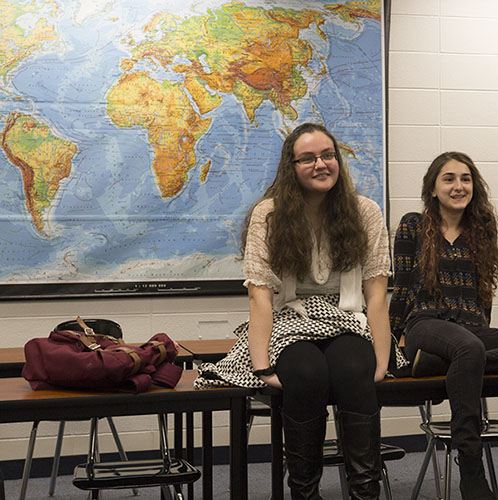Student involvement in club creates new knowledge, understanding of career paths

Participating in STAND’s Thursday meeting, Adna Mujovic listens to club sponsor Matthew Whipple. Mujovic attributes south’s wide array of clubs as a potential career exploration opportunity for students. Photo by Sean Dolan
April 28, 2016
For many students, the process of choosing a career path can often become more like jumping into a sea of the unknown. Through South’s variety of clubs, students are able to discover and clarify what their passions truly are, according to junior Adna Mujovic.
Whether it be a fine art club or a business club, these after school activities give students a glimpse into the field they are interested in. For Eric Liro, Engineering Club member, the clubs give him a better understanding of what the career entails.
“There are a lot of different fields in engineering,” Liro said. “But [Engineering Club] gives you a taste of what you might expect at a university: working as a team, building, redesigning and reinventing.”
Matt Arkema, Drama Club and TV participant, also believes clubs give students an insight into what they might expect from their field going into college and beyond.
“The TV and film programs here have definitely [prepared me],” Arkema said. “You get familiar with equipment, being in front of the camera, reading scripts, directing, even being on stage in front of a crowd of people.”
High school required courses do not always give students the necessary amount of preparation for the real world, said Rosanne McManamon, Business Partners of America (BPA) supervisor. Because of this, she believes it is important to offer courses and clubs that give this extra insight.
“Because of the push for state required courses, many kids looking to major in business leave high school having taken Consumer Education only,” McManamon said. “[…] I think it’s important that [students] start taking classes and joining clubs that will support what they want to do with their future.”
McManamon believes clubs, such as BPA, help in developing young adults for real world experiences and push students out of their comfort zones. McManamon has personally seen these changes take place through a student who had grown through being a member of BPA.
“I had one student who when he first joined was timid and shy,” McManamon said. “When he spoke to you he would kind of look at the ground. By the end of his senior year he was very grateful that [the club] brought him out of his shell, and helped him be a little more confident. He attributes it to being part of BPA.”
According to Mujovic, clubs such as Onward House Tutoring have helped spark her desire to further pursue this passion outside of the school’s walls. Mujovic now sees the possibility of continuing to tutor past high school and possibly as her job choice.
“Onward House has inspired me to get a job at the Kumon Learning Center,” Mujovic said. “My love for tutoring kids [with the club] actually led to me going over and getting a job [there]. The more I [tutor] there, the more I think of it as a potential career.”
Mujovic explains that clubs have the ability to not only reinforce students’ passions for careers, but also guide those who are uncertain towards fields they take interest in.
“I’m not exactly sure what I want to do,” Mujovic said. “But taking part in clubs and finding what interests me in school is helping me figure out what I want to do in the long run.”
Arkema has also observed the impact clubs can have on students still deciding on careers. He believes that having so many different club choices allow people to explore career interests and potential college majors.
“I think offering these clubs is a big strength of the school,” Arkema said. “People might have an idea of what they want to do, but once they find out there’s something broader built off of [it] they can explore it and find out more about it. […] Clubs here can help undecided people become decided and solidify [the career path] they want to take going into college.”
According to Arkema, he has experienced first hand the effect clubs can have on an individual’s career aspiration through being on set. Being able to explore acting though South’s TV and Film programs, Arkema said, has opened new doors for him.
“I was on set for a film, acting, and I remember it was just a really cool environment,” Arkema said. “That was the first time I was able to show my art in front of a camera, and know that it was something I wanted to do. [When] I got to do the monologue and get into that character, that was the moment I realized I could showcase an art and connect deeply with so many people.”
The development of his aspiration towards film didn’t stop there, Arkema said. As he gathered more experience in the field, his passion soon spread beyond just acting. After the inspiration of a movie, Arkema learned that there were more depth to his career choice and passions.
“Earlier this year I watched a film called Far From Heaven, directed by Tom Hanks,” Arkema said. “Just the way it was acted and shot so beautifully solidified that I want to direct and create something just as beautiful.”
Mujovic believes clubs are an important aspect of the high school experience because they offer more in-depth exposure to the different types of fields and majors students can partake in when they graduate and get older.
“This is a time of figuring out who you are,” Mujovic said. “By having plenty of different options, [clubs] are a carefree way to switch around and fluctuate what you want to do. Once we get to college we have to know what we want to be. Here it’s okay if you want to pick and choose.”


